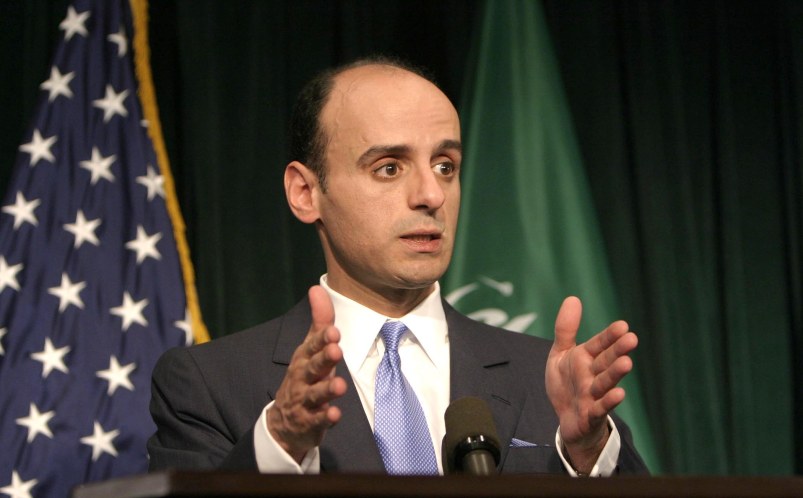It was thanks to a man who dodged a state-level narcotics offense by becoming a paid confidential source to the DEA that the feds stumbled upon an alleged plot by an Iranian official to assassinate the Saudi ambassador to the United States.
In a plan that federal officials described as “well-funded,” “chilling” and out of the “pages of a Hollywood script,” two men, allegedly working at the behest of elements of the Iranian military, plotted to hire a man they thought was affiliated with a Mexican drug cartel, to take out Saudi Arabian ambassador Adel A. Al-Jubeir, perhaps while he dined at a D.C. restraurant.
Court documents indicate that “CS-1” — confidential source one — was charged in connection with a narcotics offense by authorities in a U.S. state but the charges were dismissed in exchange for his cooperation in various narcotics investigations. The feds say he previously provided reliable and independently corroborated information to federal law enforcement agents.
Posing as an associate of a “large, sophisticated, and violent” (but unnamed) drug cartel, the cooperating source allegedly met with Manssor Arbabsiar in May. Arbabsiar, who traveled to Mexico from Texas for the meeting, allegedly explained that he was interested in attacking the embassy of Saudi Arabia.
In July, when they met again, the cooperating source allegedly told Arbabsiar that he would need at least four guys to pull off the assassination attempt and they agreed upon a price of $1.5 million.
Arbabsiar emphasized to the cooperating source that “this is politics, so these people [Arbabsiar’s co-conspirators in Iran] they pay this government… he’s got the government behind him… he’s not paying from his pocket.”
Arbabsiar also allegedly offered himself up as collateral for the final payment of the fee for the assassination. When he attempted to fly to Mexico, Arbabsiar was denied entry and flew back to John F. Kennedy International Airport in New York City, all while he was under covert surveillance by federal agents.
After his arrest, Arbabsiar spoke with agents after being advised of his Miranda rights and signed a typewritten statement admitting to the conduct.
He allegedly told agents that he believed that senior members of the Quds Force in Iran were aware of and had approved of the plot.
Arbabsiar told agents that his cousin approached him when he was in Iran in the spring and asked him to work with him. He believed his cousin was a high-ranking member of the Quds Force. He told agents he was told to use the word “Chevrolet” to refer to the ambassador plot.
When he was in federal custody, Arbabsiar placed phone calls back to a man he said was his codefendant Gholam Shakuri. “I wanted to tell you, the Chevrolet is ready, it’s ready, uh, to be done. I should continue, right?” he allegedly said. “Yes. Yes, yes,” Shakuri allegedly responded.
“Just do it quickly, it’s late, just buy it for me and bring it already,” Shakuri allegedly said.
Shakuri is still at large.
Iran’s Relationship With Saudi Arabia
Of course, none of this happens in a vacuum.
Iran and Saudi Arabia are divided along ethnic, religious and ideological lines — issues that drive much of the political posturing in the relationship. A 2009 U.S. diplomatic cable, for example, relates a conversation between the Saudi monarchy and Iran’s foreign minister in which the king tells the diplomat that Iranians, “as Persians, have no business meddling in Arab affairs.”
But there are also major political and military issues at stake.
The first of these is Iran’s alleged nuclear program. In 2008, Saudi diplomats reportedly urged American officials to attack Iran and “cut off the head of the snake.” Experts worry that if Iran acquires a nuclear weapon, it could trigger a Middle East arms race that would see Riyadh moving to develop a strategic nuclear arsenal, as well.
Leadership of the Middle East is another point of disagreement. With its vast oil reserves, Saudi Arabia has traditionally been the region’s economic center of gravity. Iran aims to challenge Saudi Arabia’s prime position, but its high demand for oil and fledgling economy simply can’t compete.
Saudi Arabia is also regarded by Iran as an agent of the West, though Saudi officials themselves downplay the U.S. alliance when they can.
As for the Quds force –Â the Iranian regime probably developed its external special operations unit in the 1980s and according to Mahan Abedin, a scholar at the Center for the Study of Terrorism in London, Iran has deployed the unit during the Cold War in Afghanistan and Lebanon; in Iraq throughout the ’80s and ’90s; in Bosnia in the ’90s; and in Iraq at the height of the U.S. presence there in 2007.
Brian Fung contributed to this report.









